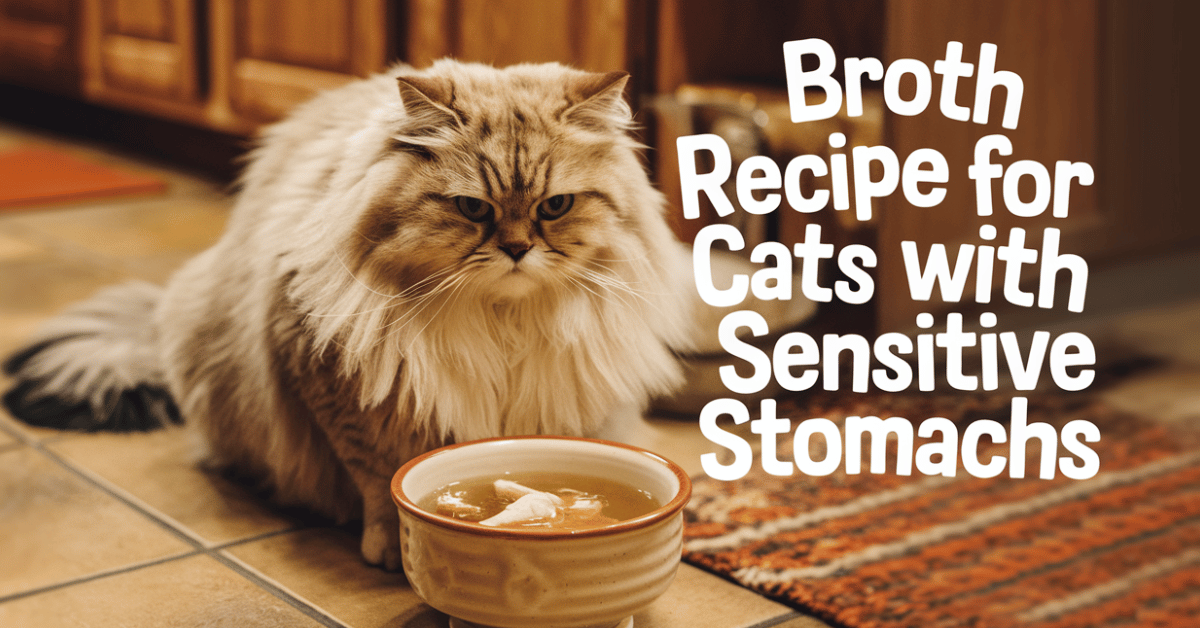Introduction to Sensitive Stomachs in Cats
If your cat could talk, would they ask for a bit more comfort in their diet? Some kitties just aren’t cut out for all the heavy-duty kibble and fancy pâtés that come their way.
Sensitive stomachs are no joke, and if your feline friend has one, you already know the look—that miserable, hunched-over stance, or even the “oh no, not again” dash to the litter box. For these delicate tummies, feeding the right food is essential to keep your cat comfortable and happy.
This is where a homemade chicken broth recipe for cats with sensitive stomachs can make all the difference. Gentle on the stomach, easy to digest, and loaded with natural hydration—it’s like offering your cat a big, warm hug in a bowl. Not to mention, it’s super simple to whip up!

Why Chicken Broth is Ideal for Cats with Sensitive Stomachs
Easily Digestible Protein
Chicken broth is more than just a tasty treat—it’s also a soothing remedy for cats dealing with digestive woes. Chicken is naturally high in protein, but when you cook it into a broth, it becomes easily digestible.
This means that even those with tummies that can’t handle the more complex ingredients can still enjoy the rich goodness. Plus, it’s great for helping your cat get some of those necessary nutrients without all the upset. Think of it as the feline equivalent of a good old-fashioned bowl of grandma’s chicken soup.
Hydration Boost
Cats, as adorable as they are, tend to be pretty bad at drinking water. If your kitty isn’t getting enough H2O—and let’s face it, most of them aren’t—that can make stomach issues even worse.
This is where chicken broth really shines: it helps your cat stay hydrated while being gentle on their system. It’s basically a two-in-one combo of hydration and nourishment that your cat’s tummy will thank you for. Plus, you get the bonus of watching them slurp it up with that delightful look of contentment!
Essential Ingredients for Cat-Friendly Chicken Broth
The beauty of this recipe is its simplicity—you don’t need anything fancy. All you need is high-quality chicken and water, plus the willpower to resist adding those kitchen staples like salt or garlic that might make it taste good to you, but are a big no-no for your furry friend.
- Chicken (preferably organic): The fresher the better. Avoid seasoned or processed chicken as they can contain harmful additives.
- Water: Simple, clean, and enough to create a hearty broth.
That’s it! No onions, no garlic, no salt—nothing but the pure goodness that’ll soothe your cat’s sensitive stomach. Remember, what’s great for us can sometimes be dangerous for cats, so keeping things plain is the name of the game here.
Step-by-Step Guide to Making Chicken Broth for Cats

Preparing the Chicken Safely
To start, grab your chicken and give it a good rinse under cool water. If you can, opt for organic chicken that’s free of any additives. Place the chicken in a pot and fill it with enough water to cover the meat completely. Bring it to a boil, then reduce the heat to a gentle simmer. Remember, slow and steady wins the race—simmering ensures that all the nutrients are extracted while keeping the meat tender.
Simmering the Broth
Once your pot is simmering, let it cook for about an hour. You want the chicken to break down and release all those yummy juices into the water. It’s important to avoid adding any seasonings—even though we humans might be tempted to throw in some salt or herbs, these can be harmful to cats. Just let the chicken do its thing, and soon you’ll have a beautifully golden broth that your kitty will love.
Straining for Purity
After about an hour of simmering, remove the pot from the heat and allow it to cool. Once it’s safe to handle, strain the broth using a fine-mesh strainer to ensure that no small bones or bits of chicken make their way into the final product. The goal is a clear, pure broth that’s easy for your cat to lap up without any risk.
Nutritional Benefits of Homemade Chicken Broth for Cats
Chicken broth isn’t just about taste; it also packs a nutritional punch that benefits your cat in multiple ways. Here are some of the key nutrients your kitty will get from this delicious homemade broth:
- High-Quality Protein: Chicken is an excellent source of protein, which helps support your cat’s muscles and overall health. Protein is especially important for keeping those zoomies strong and energy levels up.
- Vitamins and Minerals: The broth also contains essential nutrients like vitamins B6 and B12, which are great for maintaining healthy energy levels, as well as important minerals like phosphorus, which supports bone health.
- Collagen: If you simmer the broth long enough, it can extract collagen from the chicken bones, which may help with joint health. This can be especially beneficial for older cats who could use some extra joint support.
Serving and Storage Tips for Cat-Friendly Chicken Broth
How to Serve Chicken Broth to Your Cat
Once your broth recipe for cats with sensitive stomachs is ready, it’s time to treat your cat to a taste!. Make sure the broth is fully cooled before serving it to your kitty. The last thing you want is for them to burn their little tongue.
You can serve it on its own as a treat or pour a small amount over their regular food to add flavor and hydration. Start with small amounts to see how well your cat tolerates it—every kitty is different, after all!
Storage Tips for Freshness
Homemade chicken broth can be stored in the refrigerator for up to four days. If you’ve made a large batch, you can also freeze it in small portions. Ice cube trays work wonderfully for this—just pop out a cube or two whenever your kitty needs a tasty, soothing treat. Frozen broth can last for up to three months, ensuring you always have some on hand for your cat’s next gourmet experience.
Safety Precautions When Making Chicken Broth for Cats
When preparing chicken broth for your cat, there are a few important safety tips to keep in mind to ensure your kitty stays happy and healthy:
- Avoid Toxic Ingredients: Never add onions, garlic, salt, or any other spices to the broth. These ingredients can be toxic to cats and may cause serious health issues.
- Watch the Bones: Always make sure there are no bones in the broth. Chicken bones can easily splinter and pose a choking hazard or cause internal injuries to your cat.
- Serve in Moderation: While chicken broth can be a fantastic supplement to your cat’s diet, it shouldn’t replace their main meals. Treat it as an occasional snack or a way to encourage hydration.
Frequently Asked Questions About Chicken Broth for Cats
Can You Add Supplements to Chicken Broth?
Some pet owners like to add supplements to their cat’s food, but it’s best to consult your vet before adding anything to the broth. Your vet can guide you on the appropriate supplements and the correct dosage.
How Often Can Cats with Sensitive Stomachs Have Chicken Broth?
Chicken broth can be given to your cat a few times a week, depending on their tolerance and health needs. Start slow and observe how your cat responds. If they seem to enjoy it and it helps with their sensitive stomach, it can become a regular part of their diet in moderation.
What Signs Indicate a Positive Response to Chicken Broth?
A happy cat is a healthy cat! If your kitty is showing signs of improved hydration, fewer digestive issues, and an overall happy demeanor, then chicken broth might just be their new favorite thing. Just remember to keep an eye out for any adverse reactions, like vomiting or diarrhea, and always consult your vet if you’re unsure.

